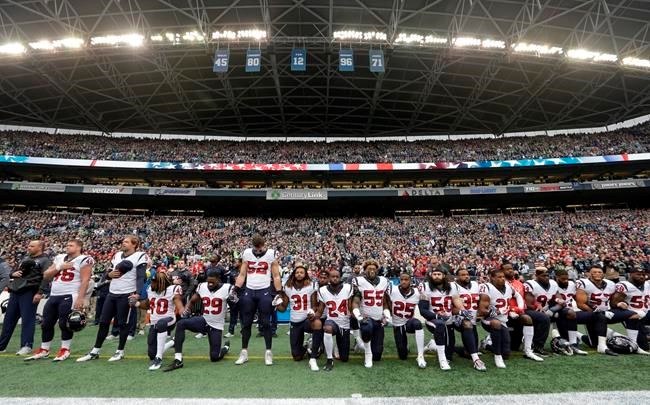With no deadlines to meet and a monthlong summer break coming up, NFL teams are in no hurry to formulate a policy on demonstrations during the national anthem.
One day after league owners mandated that players must stand for the "Star-Spangled Banner" — they now have the option of remaining in the locker room for the playing of the anthem — few of the 32 teams had done more than preliminary work on the issue.
The NFL gave teams the option of developing their own workplace rules, which many players interpreted as a backhanded way of subjecting them to fines, suspensions or loss of jobs should they carry on with the protests.
For now, other than New York Jets owner Christopher Johnson's decision to pay any fines doled out by the league without passing punishment to the players, each franchise's approach is uncertain.
After all, once mandatory minicamps end in mid-June, teams don't get together again until training camps open in late July. The opening preseason game — the first time the anthem would be played before an NFL match — is Aug. 2 when Baltimore and Chicago face off in the Hall of Fame game.
"I'm sure it's something that will be addressed, by the players and by the coaches, collectively," Lions receiver Golden Tate said Thursday. "But right now, we don't play a game until August, and that's when it's going to be applicable in football stadiums. So we've got time to kind of brainstorm some ideas on how we could stand for justice and what we can do."
What some teams have done in the past likely indicates how they will handle disciplining players for demonstrations during the anthem — regardless of the intent. Owners Jerry Jones of the Cowboys and Robert McNair of the Texans have been among the staunchest advocates of no exceptions to standing during the anthem.
Others have taken a less stringent stance, emphasizing working together with the players in their communities rather than focusing on how the message about social injustice is being delivered.
"I have always believed it is the responsibility of sports teams to be very proactive in our communities," says Jeffrey Lurie, owner of the Super Bowl champion Philadelphia Eagles.
"In this great country of ours, there are so many people who are hurting and marginalized, which is why I am proud of our players for continuously working to influence positive change. Their words and actions have demonstrated not only that they have a great deal of respect for our country, but also that they are committed to finding productive ways to fight social injustice, poverty and other societal issues that are important to all of us.
"We must continue to work together in creative and dynamic ways to make our communities stronger and better, with equal opportunities for all."
One certain thing: The uncertainty about how each team will deal with players who defy the NFL's mandate will last for weeks.
Not so for any league personnel such as game officials, sideline crews, et al. They will be disciplined for any violations of the anthem policy, though the exact punishments have not yet been determined by the NFL.
One organization, the National Action Network, will march on league headquarters Friday to "advocate for players' right to kneel and call on NFL owners to reverse (the) dangerous decision violating players' First Amendment rights by imposing fines for not standing during the national anthem."
Such protests could become more prevalent if teams decide to strongly discipline players who demonstrate during the anthem. But some franchises aren't sure they need their own policy. Or if that is even the proper description.
The Falcons' position is any players on the field will stand, so no need to make plans for any other outcome.
Team spokesman Brian Cearns suggested it's too strong to say they have a team policy: "The word policy sounds like it was mandated. It was discussed as a team and agreed upon as a team," Cearns said in an email to The Associated Press.
Defensive linemen Dontari Poe and Grady Jarrett knelt during an early season game at Detroit last year.
Coach Dan Quinn said that was a "one-off" and, sure enough, after that game all players stood together on the sideline, with arms interlocked, the remainder of the season.
"Was every player who stood last year against social justice?" Lions guard T.J. Lang tweeted "Or just the guys who do it this year because there is now a rule? Asking for a friend."
Buffalo linebacker Lorenzo Alexander doesn't expect his team "to do anything."
"I understand where they're at. And it's hard," Alexander said. "And I understand that from a business perspective trying to be socially responsible. And people can act like it's in a vacuum and say you have to pick a side. But it's not that simple. It's a very complex situation.
"And so I respect them, because I was a business owner and I understand it. It makes a big impact. I'm in this to grow the business, grow their brand, and us doing this does have an impact, whether we say it or not. That's what we want, because we're trying to bring attention to it. But they have to have a foot over here, a foot over here. It's hard."
___
AP Pro Football Writer Arnie Stapleton and Sports Writers Charles Odum, Paul Newberry, John Wawrow and Noah Trister contributed.
___
For more NFL coverage: http://www.pro32.ap.org and http://www.twitter.com/AP_NFL
Barry Wilner, The Associated Press

